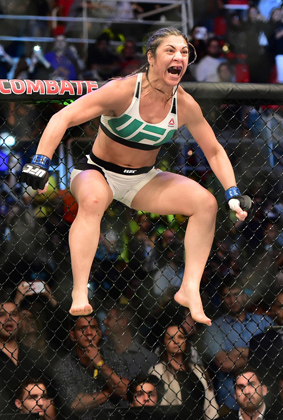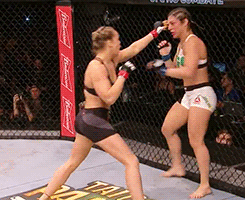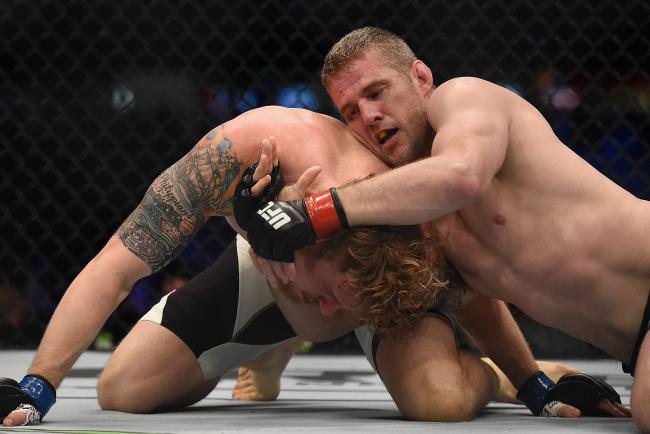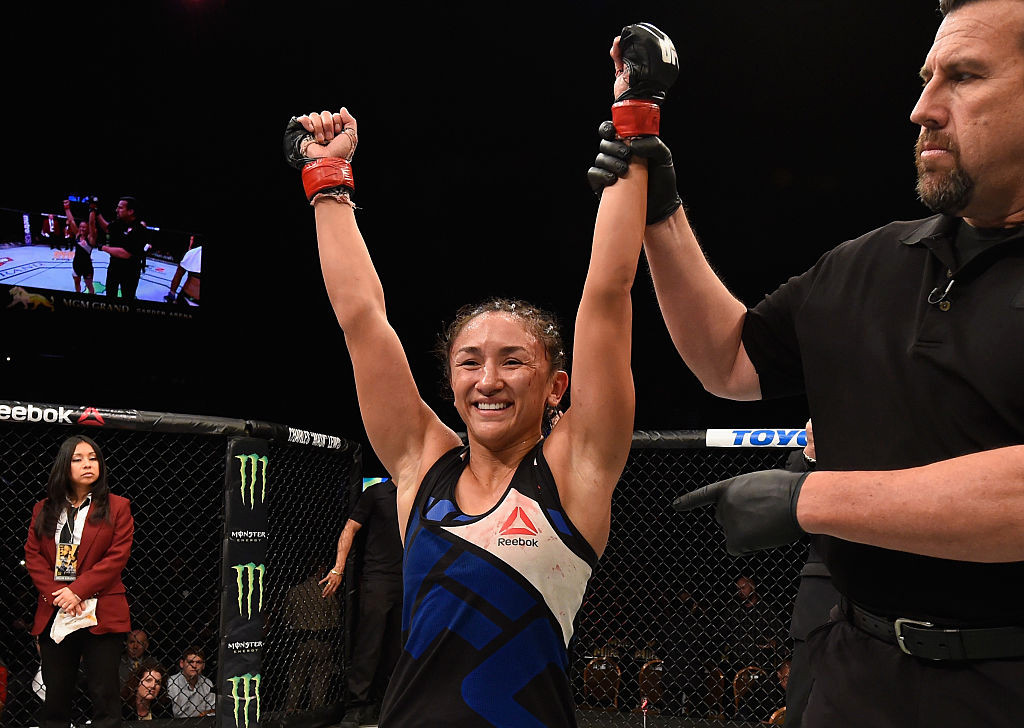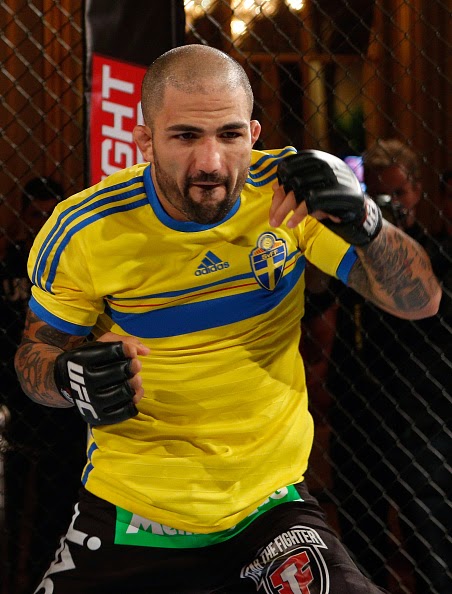Saturday night in Fortaleza, Brazil we have an intriguing matchup between two established fighters looking to reestablish themselves as hot commodities in the unpredictable and tumultuous women’s bantamweight division. First we have Marion Reneau, a latecomer to the party we call mixed martial arts who took full advantage of the opportunities presented to her by reeling off two impressive UFC wins in a row to start her Octagon career. She then hit a rough patch and lost two her next fights (one of those coming to future champion Holly Holm) before bouncing back with a win over Milana Dudieva. At UFC Fight Night 106 she seeks to build on that success when she faces former number one contender, rebuilding fighter, and subject of this article Bethe Correia.
Correia is another fighter on the comeback trail. After a violent derailment at the hands of former UFC Bantamweight Champion and pound-for-pound queen “Rowdy” Ronda Rousey, followed by a competitive loss to Raquel Pennington, Correia was left scrambling for wins and fighting for the opportunity to continue to ply her trade in the UFC. A win over embattled Jessica Eye, however, has Correia back on the winning track and poised to make some headway in a division defined by its instability and unpredictability. Today we discuss Bethe Correia — her career, her fight style, and the opportunities for her moving forward if she wins Saturday night.
Bethe Correia came into the Ultimate Fighting Championship with little fanfare and no accolades, as she hadn’t had a background in combat sports, nor was she some sort of top-tier athlete as it pertains to any other sport. Correia quickly established herself as legitimate fighter, going the distance with women’s mixed martial arts pioneer and former top contender Julie Kedzie en route to winning a heavily disputed decision. She then rattled off two more impressive wins on the way to a title shot against Rousey at UFC 190. The title fight was short, violent, one-sided and decisive; Correia lost by first-round knockout and was forced to regroup.
At that point, she had a 3-1 UFC record, one that upon initial inspection looked legit, but upon review, the wins that led to that title shot looked less impressive, leaving the impression that the approach Correia took in promoting fights had much more to do with her rise up the ranks than her actual fighting skills. All of her wins were against fighters who no longer compete in the UFC. One of them was Shayna Baszler, a pioneer and faded former fighter who no longer had the physical athleticism or stamina to compete with the new age of female fighters. Another was Jessamyn Duke, a physically limited, inexperienced, and technically underdeveloped fighter. And the other was Kedzie, a seasoned but declining fighter who many felt Correia lost to. For all she had “accomplished,” there were many questions about how good she was and how good she could be moving forward; all of that talk was multiplied by the loss to Rousey.
In many ways Correia is similar to last week’s subject, Daniel Kelly, in that her game isn’t defined by top end athleticism or high-level technical skill. She is defined by grit, deliberate aggression, physicality, and volume. She applies pressure to opponents, forcing them to attack under the perceived threat that comes with her pressure and feints. Once an opponent attacks, Correia is in her comfort zone, but she lacks the temperament, hand speed, and comfort to effectively and consistently initiate offense. She takes advantage of openings presented to her by opponents trying to push her back, or trying to halt her forward movement with sharp and well-timed counters. Unlike many counter fighters who will hit you with ones and twos, Correia will swarm with threes, fours, fives, and sixes, attacking the head and body and forcing her opponent back, punching her way into clinches, then breaking down her rivals with short punches, elbows, and knees.
The clinch is another similarity she has with Kelly. Though not a world class judoka, Correia has the same reasoning behind her use of the clinch; she uses it to disrupt her opponents’ offense, to take away their explosiveness and movement. Correia alternates between strikes, trips, and sweeps to unbalance her opponents, maintain control, and create more opportunities to overwhelm her opponents with volume and physicality. Correia’s ability to defend and recover from takedowns allows her, much like it allows Kelly, to apply consistent and effective pressure on her opponents, which affords her a lot of freedom in how she attacks and makes up for her lack of refinement in the technical aspect of striking.
Correia’s game is more right idea than flawless execution; she is a savvy, tricky, and very intelligent fighter, which she uses to offset the physical and technical disadvantages she repeatedly finds herself facing. The difference between Kelly and Correia is the versatility: Kelly has more variety in both the clinch and his entries into the clinch, while Correia has shown more ability to counter, be it standing her ground, applying pressure, or off of her back foot (a rare talent among MMA fighters).
This brings us to Marion Reneau, who at 3-2 in the UFC is one of the more active fighters in the division. But what separates her from the majority of the women at bantamweight is her athleticism; even at age 39, Reneau is one of the strongest, most explosive, most quick-footed and quick-fisted fighters at 135 pounds. Her standup is as one note as it is effective; Reneau has a nice one-two and kicks, but what she doesn’t have is the natural tendencies and comfort of a striker. Nor does she have the comfort or confidence to use any real variety or aggression on the feet, except in spots where an opponent will let her get off or be dissuaded by her overall athleticism. For as good as an athlete as Reneau is, she still remains a painfully inconsistent and ineffective striker at all ranges. Of even more concern is her tendency to be pressured, manhandled, and physically roughed up by opponents who are largely inferior to her physically.
Where Marion Reneau shines is her ground work. Unlike her striking, which is effective, but stiff and predictable, on the ground she is comfortable and has natural instincts, fluidity, and explosiveness in transitioning to submissions and making attempts to do so without opening herself up to being pounded out or submitted herself. Reneau’s ground game is well respected, as very few fighters are willing to chase takedowns and try to work for control or seek to finish her on the ground with strikes or submissions. The problem Reneau has is her inability to create openings with her strikes or apply the kind of consistent pressure with her footwork that creates opportunities for clean entries into takedown attempts, which limits her ability to chain together attempts to get to the position she shines at.
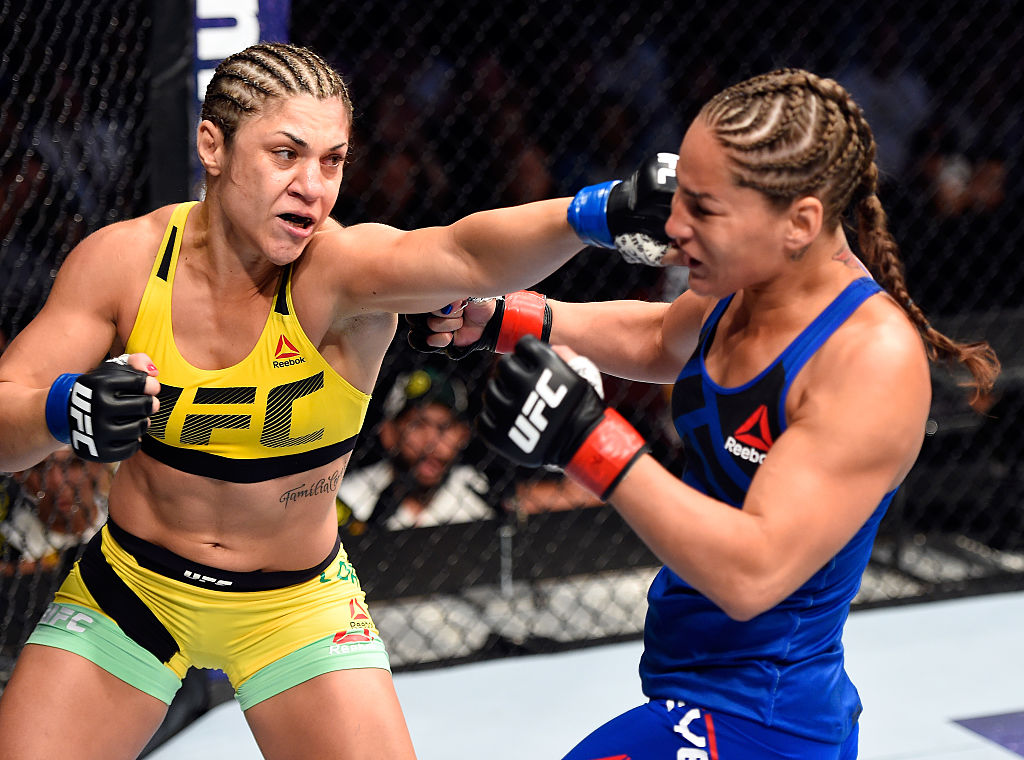 In my opinion, Bethe Correia should be the favorite. She was exposed against the best athlete in her division in Rousey, so a fighter with Reneau’s size, athleticism, and power is a definite threat to her, given her technical and physical limitations. That being said, Reneau is the epitome of a fighter who has the ability to do whatever she wants, but is mentally unable to pull the trigger in regards to being truly offensive and aggressive. And much like Jessica Eye (another former Correia opponent), Reneau is a fighter who has issues transitioning between ranges, as she has routinely gotten stuck in standup battles and has shown no ability to force a fight into the phase she dominates, nor can she take advantage of strategic errors by opponents that allow her to get a fight where she really wants it.
In my opinion, Bethe Correia should be the favorite. She was exposed against the best athlete in her division in Rousey, so a fighter with Reneau’s size, athleticism, and power is a definite threat to her, given her technical and physical limitations. That being said, Reneau is the epitome of a fighter who has the ability to do whatever she wants, but is mentally unable to pull the trigger in regards to being truly offensive and aggressive. And much like Jessica Eye (another former Correia opponent), Reneau is a fighter who has issues transitioning between ranges, as she has routinely gotten stuck in standup battles and has shown no ability to force a fight into the phase she dominates, nor can she take advantage of strategic errors by opponents that allow her to get a fight where she really wants it.
That sort of fighter does not do well against Correia. Duke, Baszler, and Eye all had that issue, which afforded her the freedom to apply pressure relentlessly, countering her opponents to the head and body to make them defensive before ramping up the aggression and overrunning them with volume on the way to stoppages or clear decision losses. Marion Reneau has the physical talent and size to assert herself in the Octagon and outclass Correia; what she doesn’t have or hasn’t shown is the cage IQ, activity, physical durability, or diversity to beat an opponent who doesn’t give her clear avenues to victory. Correia will not do that; if Reneau wants a win, she is going to have to earn it, and when she has had to fight for wins, she has not gotten them.
Saturday night at UFC Fight Night 106, two fighters will enter the cage as middling bantamweights, scrambling to gain a foothold that will allow them to ascend in the division on the way to attaining a top ten ranking, and hopefully, an eventual title shot. One fighter is striving to prove she is more than an act, and the other is trying to prove she is more than an athlete. One will succeed and one will fail, when the Octagon door closes and things get real.

UFC Fight Night 106: Belfort vs. Gastelum (formerly UFC Fight Night 107: Belfort vs. Gastelum) takes place March 11, 2017 at Centro de Formacao Olimpica do Nordeste in Fortaleza, Ceara, Brazil.
Click the stars to rate how good you think UFC Fight Night 106 will be.
*********

